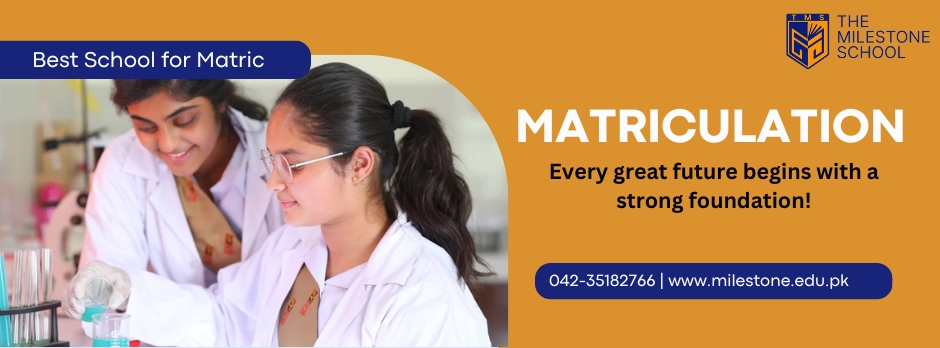In Pakistan, approximately 83% of students successfully transition from primary to secondary education, but challenges remain in ensuring quality education at the higher level (source: Pakistan Education Statistics).
The Milestone School (TMS) addresses these challenges by implementing a STEM-focused curriculum. With highly qualified teachers, well-structured courses, and a commitment to student success, The Milestone School is setting new standards for secondary education.
We focus on critical thinking, problem-solving, and real-world applications. Interactive classes, digital learning tools, and personalised attention make TMS one of the best schools in Lahore and Rawalpindi.
What is Matric in Pakistan?
Matric, or Matriculation, is the most common high school qualification in Pakistan. It includes Grade 9 (SSC Part I) and Grade 10 (SSC Part II), which lead to the Secondary School Certificate (SSC). Completing matric is essential for students who wish to pursue higher secondary education like FSc, ICS, FA, or ICom.
Subjects for Matric in Pakistan
Students in matriculation select between two major study groups:
Group 1: Science (Pre-Medical & Pre-Engineering)
These subjects are for the students who want to pursue their career in medical or advanced engineering fields. The subjects include:
- Compulsory Subjects: English, Urdu, Mathematics, Pakistan Studies, Islamiyat
- Pre-Medical Electives: Physics, Chemistry, and Biology
- Pre-Engineering Electives: Physics, Chemistry, and Computer Science/Mathematics
Group 2: Arts / Humanities
Group 2 includes subjects for students who are passionate about art, marketing, politics, etc. The subjects include:
- Compulsory Subjects: English, Urdu, Mathematics, Pakistan Studies, Islamiyat
- Elective Subjects: Civics, Education, General Science, Home Economics, Computer Science
Matric Examination & Grading System
The Board of Intermediate and Secondary Education (BISE) conducts exams annually. Grade 9 exams take place in the first year, and Grade 10 exams in the second.
Matric Grading System:
- 90% – 100% = A+ (Outstanding)
- 80% – 89% = A (Excellent)
- 70% – 79% = B (Very Good)
- 60% – 69% = C (Good)
- 50% – 59% = D (Satisfactory)
- 40% – 49% = E (Pass)
- Below 40% = F (Fail)
Students in the top schools in Pakistan, like The Milestone School, perform better due to expert faculty and modern learning strategies. The best schools in Lahore and Rawalpindi follow the BISE curriculum strictly to ensure top results.
Paper Pattern for Matriculation Subjects
The matriculation (SSC) examination system in Pakistan follows a structured paper pattern, but not all subjects carry the same weightage in terms of marks. Some subjects, like Islamiat and Pakistan Studies, have different marks allocation compared to core subjects like Mathematics, Science, and English.
Here’s a breakdown of the general paper pattern and variations in subject weightage:
1. Core Science Subjects (Total Marks: 100 Each)
These subjects have a total of 100 marks, divided into theory and practical components where applicable. Here is the paper pattern for science subjects:
| Section | Marks Distribution | Details |
| Objective Section (MCQs) | 20% of total marks | Multiple-choice questions (MCQs) based on key concepts, formulas, and definitions. Evaluates quick thinking and conceptual clarity. |
| Short-Answer Section | 40% of total marks | Brief, to-the-point questions that test fundamental concepts, definitions, and problem-solving skills. Includes diagram-based, fill-in-the-blanks, and reasoning questions in science subjects. |
| Long-Answer Section (Theory & Detailed Questions) | 40% of total marks | Detailed explanations, step-by-step solutions, and reasoning. Mathematics and Science subjects involve problem-solving. |
2. Compulsory Subjects without Practicals (Total Marks: 100 Each)
Compulsory subjects without practicals include English, which focuses on grammar, comprehension, and essay writing, and Urdu, which covers grammar, literature, and summary writing. Both subjects emphasise language skills, critical analysis, and effective communication through structured assessments.
3. Subjects with Different Marks Distribution
Some subjects have a total of 50 marks:
- Islamiat (Islamic Studies) – 50 Marks: Includes MCQs, short answers, and detailed questions on Islamic teachings, history, and Quranic verses.
- Pakistan Studies – 50 Marks: Focuses on Pakistan’s history, geography, and current affairs.
4. Arts & Humanities Subjects
For students opting for humanities, subjects like Education, Civics, Economics, and General Science follow a 100-mark exam without practical components.
Matric vs. O-Levels – What’s the Difference?
Matric follows a national syllabus with a structured exam pattern. However, O-Levels offer an internationally recognised curriculum.
The key differences are highlighted in the table below:
| Feature | Matric (SSC) | O-Levels |
| Governing Body | BISE (Pakistan) | Cambridge International |
| Duration | 2 Years (Grades 9 & 10) | 3 Years (Stages 8, 9 & 10) |
| Subjects | Fixed syllabus | Flexible subject choices |
| Recognition | Accepted in Pakistan | Internationally Recognized |
| Difficulty Level | Moderate | Comparatively Advanced |
TMS offers both Matriculation and O-level education, providing students with diverse academic pathways tailored to their learning needs and future aspirations.
Matric vs. Secondary School in Other Countries
Matriculation in Pakistan differs significantly from secondary school systems in other countries in terms of curriculum, grading, and assessment methods. The table below outlines the equivalent of Matric (Grade 10) in different countries:
| Country | Equivalent to Matric (Grade 10) |
| USA | High School Freshman & Sophomore (9th & 10th Grade) |
| UK | GCSE (General Certificate of Secondary Education) |
| Australia | Year 10 Certificate |
| Canada | Secondary School Grade 10 |
| India | SSC (Secondary School Certificate) |
Academic Pathways After Matriculation
After completing matriculation, students have several academic pathways to choose from, each leading to distinct career opportunities:
- FSc (Pre-Medical/Pre-Engineering): Ideal for those pursuing careers in medicine or engineering.
- ICS (Intermediate in Computer Science): A strong foundation for IT and software-related fields.
- FA (Fine Arts): Suitable for students interested in humanities, social sciences, and creative disciplines.
- ICom (Intermediate in Commerce): A practical choice for business, accounting, and finance careers.
- DAE (Diploma of Associate Engineering): Focused on technical education and hands-on training for various engineering fields.
Choosing the right path depends on individual interests, strengths, and career aspirations.



